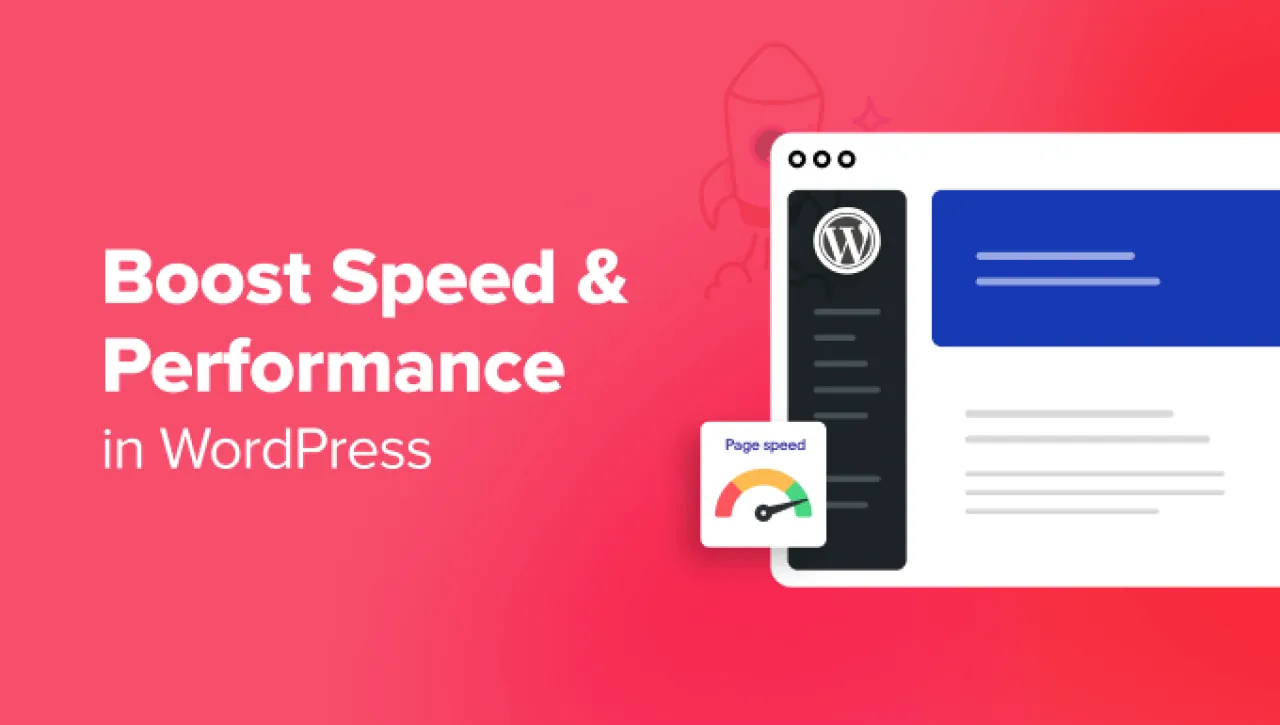Boost WordPress Speed & Performance

Want to enhance the performance of your WordPress website? Accelerate your site’s loading times can not only elevate the user experience but also significantly contribute to better pageviews and search engine optimization for your WordPress site.
In this comprehensive guide, we'll delve into the top strategies for optimizing your WordPress site's speed and performance.
Optimizing WordPress Speed and Performance
This is not just another listicle of "top WordPress caching plugins" or a basic tutorial with "tips to accelerate WordPress." Think of this as an all-encompassing manual for WordPress performance tuning.
We've aimed to tackle all angles—starting with the relevance of quick loading speeds, identifying factors that could bog down your WordPress site, and providing actionable recommendations that you can implement to enhance your WordPress site’s speed right away.
For your convenience, we've organized this guide into a user-friendly table of contents, allowing you to jump straight to our expert advice on turbocharging your WordPress site.
Why Speed Is Important for Your WordPress Site
The rapid decline in human attention span from 12 seconds in the year 2000 to a mere 8.25 seconds today has profound implications for anyone running a website. This shortened attention span underscores the critical importance of website speed, especially for those managing WordPress sites.
As a website owner, it is essential to comprehend that you are granted a limited window of opportunity to capture the interest of your visitors and engage them with your content. A website plagued by sluggish loading times is likely to falter, causing potential visitors to abandon the site prematurely.
Research underscored by a case study from StrangeLoop, which included heavyweight digital names like Amazon and Google, underscores the impact of load times on a site's bottom line: a single second's delay can precipitate a 7% dip in conversion rates, diminish page views by 11%, and erode customer satisfaction by 16%.
The implications extend beyond user experience. Search engines such as Google have begun to wield load time as a factor in their ranking algorithms, demoting slower sites and thus cutting their visibility and traffic flow.
To draw more visitors, grow your subscriber base, and enhance your site's revenue potential, optimizing your WordPress site's speed is not just an option—it's an imperative.
How to Check Your WordPress Website Speed
It's a common misconception among newcomers that their website's performance is adequate simply because it seems responsive on their personal machines, which can be misleading.
Browsers like Chrome are engineered with sophisticated caching systems and pre-fetch mechanisms that significantly speed up the loading times of frequently visited websites, including your own. This may give you the impression of a brisk user experience.
Yet the reality for first-time visitors, or those accessing the site from a variety of global regions, could be starkly different. These users may face much slower loading times, impacting their perception and use of your website.
To accurately gauge the performance of your website from an external perspective, we advise employing performance evaluation tools such as the IsItWP's WordPress speed test. This complimentary online service provides a detailed analysis of your website's loading speed.

For additional insights and best practices, consider browsing our comprehensive guide on conducting effective website speed tests.
In determining an optimal loading time for your website, you should strive for a benchmark of fewer than 2 seconds. Naturally, the rule of thumb is "the quicker, the better;" marginal enhancements, even by mere milliseconds, can cumulatively lead to substantial reductions in overall load time, potentially cutting it down by as much as a second or more.
What Slows Down Your WordPress Website?
Enhanced Report: Your website performance evaluation will contain a host of expert insights, however, deciphering the technical language can be a daunting task for those new to the field.
Comprehending the factors that decelerate your website is crucial for elevating its efficiency and forming informed decisions for future optimizations.
The fundamental contributors to a sluggish WordPress site encompass:
- Hosting Service Quality: Suboptimal server configuration at your hosting provider can be detrimental to your site's speed.
- WordPress Configuration: Lacking a caching mechanism on your WordPress site can place undue stress on your server, potentially leading to slowdowns or even complete site crashes.
- Page Size: Hefty-sized pages will load at a snail's pace, especially when bogged down by unoptimized images intended for web use.
- Plugin Quality: Utilization of plugins that are inefficient or poorly constructed can be a significant drag on site speed.
- External Scripts: The incorporation of various external scripts, such as advertisement elements and font loaders, can also exert substantial strain on your site’s performance metrics.
With an understanding of the elements that impede your WordPress site, you can now focus on strategies to enhance its speed and responsiveness.





